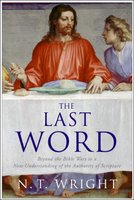What Do You Mean?
 I am currently reading (actually I started reading it last week, and haven't had the chance to pick it back up till now) N.T. Wright's new book entitled The Last Word: Beyond the Bible Wars to a New Understanding of the Authority of Scripture, and in the first chapter he says something that I had never consciously thought of before, but which once I read it, seemed like the only logical conclusion:
I am currently reading (actually I started reading it last week, and haven't had the chance to pick it back up till now) N.T. Wright's new book entitled The Last Word: Beyond the Bible Wars to a New Understanding of the Authority of Scripture, and in the first chapter he says something that I had never consciously thought of before, but which once I read it, seemed like the only logical conclusion:"When we take the phrase 'the authority of scripture' out of its [shorthand] suitcase, then, we recognize that it can have Christian meaning only if we are referring to scripture's authority in a delegated or mediated sense from that which God himself possesses and that which Jesus possesses as the risen Lord and Son of God, the Immanuel. It must mean, if it means anything Christian, 'the authority of God exercised through scripture'" (25).
I agree with this statement, and I appreciate this long-overdue clarification. What think ye?


1 Comments:
I just finished reading it last night…a fabulous work from Wright as usual. His arguments are clear and his writing poetic. One cannot read this without wanting to read more.
I like what he said about the authority of scripture on page 59, “…It has everything to do with understanding human renewal as the beginning, the pointer toward, and even the means of, God’s eventual eradication of evil from the world and the bringing to birth of the new creation itself. Thus, so the early Christians believed, God’s word was at work by the Spirit within the community, to put Jesus’s achievement into effect and thus to advance his final Kingdom.”
Scripture “has nothing to do with the declaration of an arbitrary or ‘controlling’ ethic, a standard imposed from without by constricting or bullying authority in the early church.” Further, as he argues elsewhere, Scripture is not simply a set of timeless truths. Rather, it is the “book that forms the basis for the new telling of the story through which Christians are formed, reformed, and transformed so as to be God’s people for God’s world.”
This work shows a deeper understanding of the authority of Scripture then I have read anywhere else.
Further, I like his argument against the “literalist” interpretation of scripture (at least the modern, North American, traditionalist understanding…I think these are the terms he used!)When Jesus said, “this is my body” did he mean that literally? If he did, then why don’t catholic and protestants alike hold to the doctrine of transubstantiation?
Finally, his assessment of the continuity between the Old and New Testament reek havoc for any dispensationalist!
Post a Comment
<< Home